Tooth extraction is a stressful situationeven if the operation is performed under the influence of pain medication.
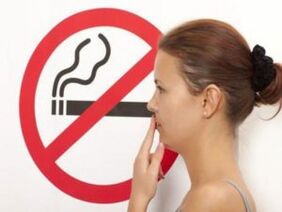
And strong smokersafter the emotions experienced, will surely last for a cigarette, thus trying to relax a bit.
This is how they think about relieving the pain that usually starts to build up as the anesthetic goes away.
And it just is not worth doing.In the following article we will address the question of whether smoking is possible after tooth extraction and why it is strictly forbidden to do so immediately after the procedure? We will give recommendations for different cases.
Effect of cigarette smoke and nicotine on tooth extraction recovery
Remember!The composition of cigarette smoke contains a large amount of chemical elements and compounds that harm the body as a whole and, at the same time, hinder the wound healing process.
Nicotine is a strong irritant to the nest edges left after surgery.
It narrows the blood vessels that carry blood to the wound.
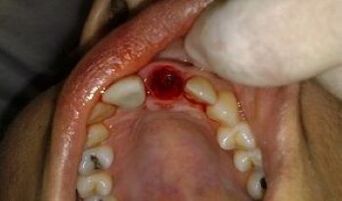
The longer and more violently the tobacco acts on the wound, the more it will have to heal.
Smoking also negatively affects the blood clotting process.
As a result, the wound remains open for a long time, constantly bleeding, as a result of which the risk of infecting her with various infections increases several times.
Inflammation is a consequence of infection in the wound cavity.
Symptoms and signs: general malaise, headache, fever, redness of the gums, acute pain in it.
How long is smoking banned?
Worth mentioning!Dentists recommend that you observe at least a minimum period of cessation of smoking after tooth extraction - 2-3 hours.
After this time, you can smoke, but only if the bleeding has stopped completely.
When can I smoke after extracting a wisdom tooth?
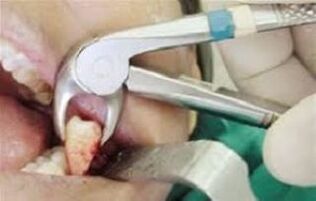
Extracting a wisdom tooth (figure eight) is a long and painstaking process.
This tooth is characterized by a broad, overgrown, often curved root, which sometimes needs to be removed in parts.
A large wound remains in the gums after such an operation, on which dentists often sew and drain.
Also, doctors often prescribe antibiotics to prevent inflammation.
Stay informed!When leaving the medical office, a smoker should definitely consult a dentist about when to smoke their first cigarette and start eating.
The doctor's answer will depend directly on the patient's health condition, the course of the operation, etc. As a rule, all recommendations are purely individual.
How long should I smoke after sewing?
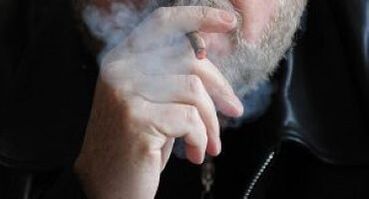
If, after extraction, the doctor sutures, he may recommend that you make the first powder no earlier than in 2 - 10 days.
This time is needed for complete wound healing and resorption of postoperative sutures.
In case of non-compliance with the recommended smoking cessation, complications may develop after surgery.
Even a single cigarette can delay wound healing.
How long can I smoke?The ideal option is not to return to addiction for 2 to 10 days.
hookah and electronic cigarettes
Hookah, like electronic cigarettes (evaporation), is contraindicated in patients for at least 3 hours after surgery. Heated smoke or steam irritates soft tissues and can cause recurrence of bleeding.What consequences can you encounter?
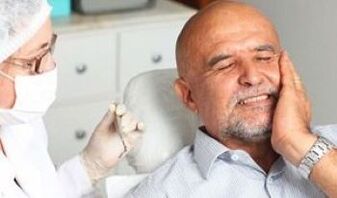
Every patient has the right to decide independently whether to smoke or not. But before taking the first powder, it is advisable for every smoker to be aware of the consequences that are possible if the dentist’s recommendations are not followed.
Most of them can lead to serious health problems, and some can even be fatal.
There are 3 particularly dangerous complications for a smoker:
- Osteomyelitis.
Purulent inflammation of bone tissue as a result of infection. This disease is very serious and, if not treated properly, can lead to the death of the patient. - Alveolar osteitis(dry nest).
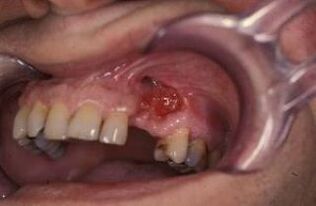 A condition in which there is no blood clotting in the fossa, which is a natural barrier for infections to enter the hole. A blood clot can "come out" under the influence of nicotine, a feature of which is its ability to increase blood pressure inside the vessels.
A condition in which there is no blood clotting in the fossa, which is a natural barrier for infections to enter the hole. A blood clot can "come out" under the influence of nicotine, a feature of which is its ability to increase blood pressure inside the vessels. - Alveolites.
Inflammation of the tooth socket and nearby tissues after its removal. The hole area begins to hurt a lot, swells and becomes covered with a gray layer, the patient's temperature rises, submandibular lymph nodes grow, food intake is impossible due to acute pain.
What else is not recommended?
You should know!After tooth extraction, some recommendations should be followed:
- Brush your teeth, rinse your mouth for 24 hoursafter surgery. Such events can provoke the "washing" of the blood clot.
- Take a hot bath, visit a spa, a sauna.A high temperature can cause an increase in pressure and, as a result, renewed bleeding.
- Load yourself physically. Exercise can also cause hypertension.
- Drinking alcoholI am another factor that can trigger a hypertensive attack and, as a result, bleeding from a wound.
- Eat immediatelyafter extraction: it is best to wait 2-3 hours.
- Do not allow dishes to be hot, cold, which can damage the oral cavity. It is also better to abstain from spicy foods. Do not open your mouth wide after sewing: muscle tension can provoke their discrepancies.
- it's better not to drive,because the pain relievers used during extraction can make you drowsy.

Important! After tooth extraction, the patient can place ice on the cheek to relieve pain, take the sedative recommended by the doctor (in addition to aspirin).
No earlier than 20 minutes it will be possible to remove the tampon soaked in antiseptic, provided the bleeding has stopped completely.
If the tampon stays on the wound longer, it can become an ideal breeding ground for bacteria.
Also read articles that will help to study the issue in more detail,which will make prevention faster and better:
- how to get rid of the smell of cigarettes from the mouth;
- toothpaste for smokers;
- tongue and smoking;
- toothpaste.
Reviews
Below are some estimates. If you have something to say - leave your feedback in the comments below the article, it will be useful for our readers.
I was tortured by a wisdom tooth: I was constantly sick, I started to collapse. My dentist recommended removal as the only option.
I agree right away: I'm tired of constantly taking pain medication. The operation went well, but the stitches still had to be sutured.
But what was my surprise when the doctor mentioned quitting smoking! And I am a strong smoker, a cigarette helps to cope with irritation, anger, and even pain.
Why should I have resisted a withdrawal right after leaving the hospital! But the will prevailed. The result is a successful healing process.
My tooth was pulled out. The doctor, giving postoperative recommendations, drew my attention to the fact that it is better to abstain from smoking for 2-3 hours.
I could not resist even half an hour - I lit a cigarette: the blood started flowing from the wound almost immediately and did not stop.
I had to go back to the doctor for help. Good thing I got back to the hospital because everything could have ended much more sadly.
The dentist said there is a high risk of infection in the wound due to the fact that nicotine eats at its edges and does not allow it to tighten.
Baths with herbal infusions are able to alleviate the patient's condition and speed up the healing process.
Pour a bag of chamomile with boiling water, soak for half an hour and cool to room temperature. The infusion should be taken orally and held for about two minutes without rinsing.
No matter how strong your addiction to smoking, you still need to use common sense.
The correct and only correct step is to follow all the doctor's recommendations.
Otherwise, the negligent patient will have to pay a very high price for disobedience - the price of his health. Is it worth inflating nicotine?























